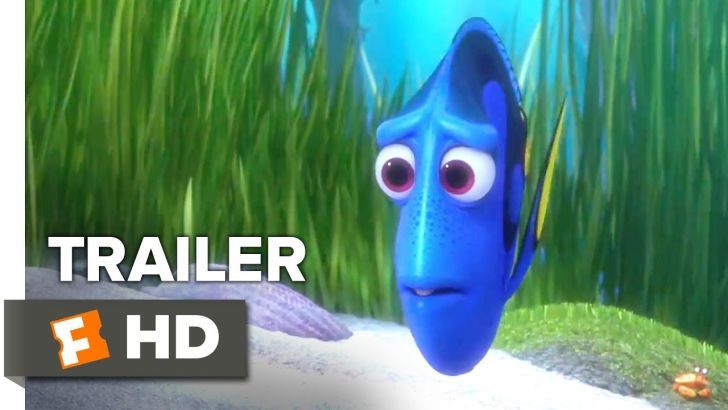Finding Dory: Chaos is the plan
One of Pixar's biggest hits at the box office, Finding Dory is a testament to the power of inclusivity.

As promised, this begins The Pixar Project, where I’m going to review all of the Pixar films in the run-up to the Dec. 25 release of Soul. If you know a friend or relative or Pixar aficionado who’d enjoy this project, please pass it along.
The smash-hit follow-up to Finding Nemo came out 13 years later, but Finding Dory was worth the wait. It was another Pixar film seen in the company of my mom, and I was 28 years old at the time.
Finding Dory takes place an unspecified amount of time after we found Nemo, and Dory seems to be thriving in her very specific way. After numerous retellings of her role in Nemo’s lost-and-found story, she has flashes of her own lost-but-not-found origin story. She wandered off from her parents as a wee young thing and had grown up without them (and seemingly of the memory of being lost or that she should even be looking for them). She remembers then she must act, so off she and Marlin and Nemo go.
The majority of her search takes place in the Marine Life Institute, in sunny California, where she remembered, in fragments and bits, her family living when she was a child. In and around the institute, she meets a happy host of helpers, and the best part about them, to the last one, is differently abled, just like Dory. You’ve got Hank, the octopus who’s been taken down a peg and is actually only a septopus, as Dory reminds him, because he lost a tentacle. There’s Destiny, a near-sighted whale shark, the very same who taught Dory to speak whale, a skill that ended up saving Dory and Marlin in the first film. Then there’s Bailey, the beluga whale who thinks he can no longer echolocate.
We can’t forget Becky, the loony loon who flies Nemo and Marlin around in a bucket. Plus the original differently abled star, Nemo, with his lucky fin.
There’s a heartwarming message about turning perceived deficits into strengths, about forging one’s own path to get to where she’s going. As A.O. Scott said in the New York Times, the theme of Finding Dory is embracing the chaos. That’s Dory’s M.O., and, speaking for myself only, it’s terrifying to think of adopting it as a life strategy.
For those who aren’t so willing to throw caution to the wind, Dory’s life lessons are still valuable as a reminder that we need not crumple at the first sight of chaos in our lives. Our first perceptions in those moments are often of the world speeding up, the inputs feel dialed up to 11, and it’s overwhelming. It’s comforting to have life planned out two, three, four moves ahead, but I’m sitting here as a testament to the fact that chaos can be a good thing. It’s chaotic to blow up a steady, stable life to do something with tons of inherent risk. I know that, felt it deeply; in the moments between January and June when I couldn’t find a job and lost a relationship I was desperate to hang on to, chaos ruled.
I’m not advocating chaos, mind you. I’m acutely aware of the privilege I was afforded by having a loving family and a soft place to land when things got chaotic for me. I’m simply saying that life is treating me well, and for a little while, I had to steer into the skid, stop straining and fighting so much, and consider things that I never had before. I was certainly not looking for a newspaper job in northeast Wyoming when I graduated from Mizzou; if there’s anything I can say with any certainty, it’s that I had rarely, if ever, thought about northeast Wyoming. But here I am, writing and reporting in a way that’s fulfilling and of which I’m proud. A little chaos can be a good thing.
The film’s wacky conclusion is the moment Hank, the surly octopus who’s just seeking a tank to himself in Cleveland, buys into Dory’s worldview. His plans (and desires, for that matter) are hotwired by his interaction with Dory, and he simply follows her, knowing full well how she operates by gut instinct and signs from the universe rather than any calculated rhyme or reason. He trusts in the same forces that Dory trusts in — the magic of chaos.
What I love about the film is how it grounds the chaos as particular to Dory’s short-term memory problems, but it deals with the chaos, with the help of her new friends, without focusing on the abilities directly. It goes unsaid. They are traits of the characters, and no matter how influential on their lives, they are never definitional. The characters are always so much more than whatever imperfection besets them.
It was a beautiful case of representation that was not self-congratulatory. Generations of differently abled kids (and adults) will see a big-ticket blockbuster that recognizes their reality but simply goes about its business as normal. Pixar did all of that while deepening our understanding and appreciation of one of our most beloved characters in the history of all its films, which is quite an accomplishment for a sequel.
If you liked what you read, please sign up, follow me on Twitter ( @CaryLiljohn06 ) and then forward to friends to help spread the word.
Comments